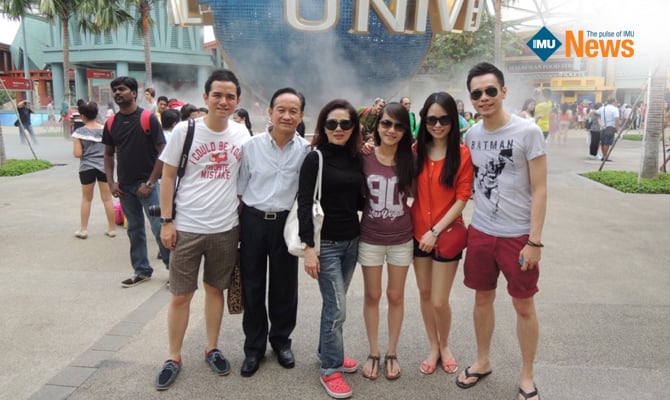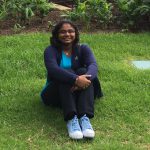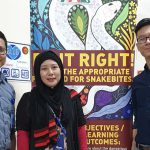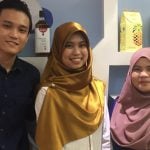As a doctor, it is seeing the smile and happiness on a patient’s face that motivates him/her to continue doing what he/she is doing. This is definitely the motivation for our alumnus, Dr Raymond Choy Wai Mun, to continue working as a General Practitioner at the Raffles Medical Group (RMG), Singapore. He also works for RMG as a doctor in the Emergency Response Team at Changi International Airport and a Physician Leader in the airport cluster. 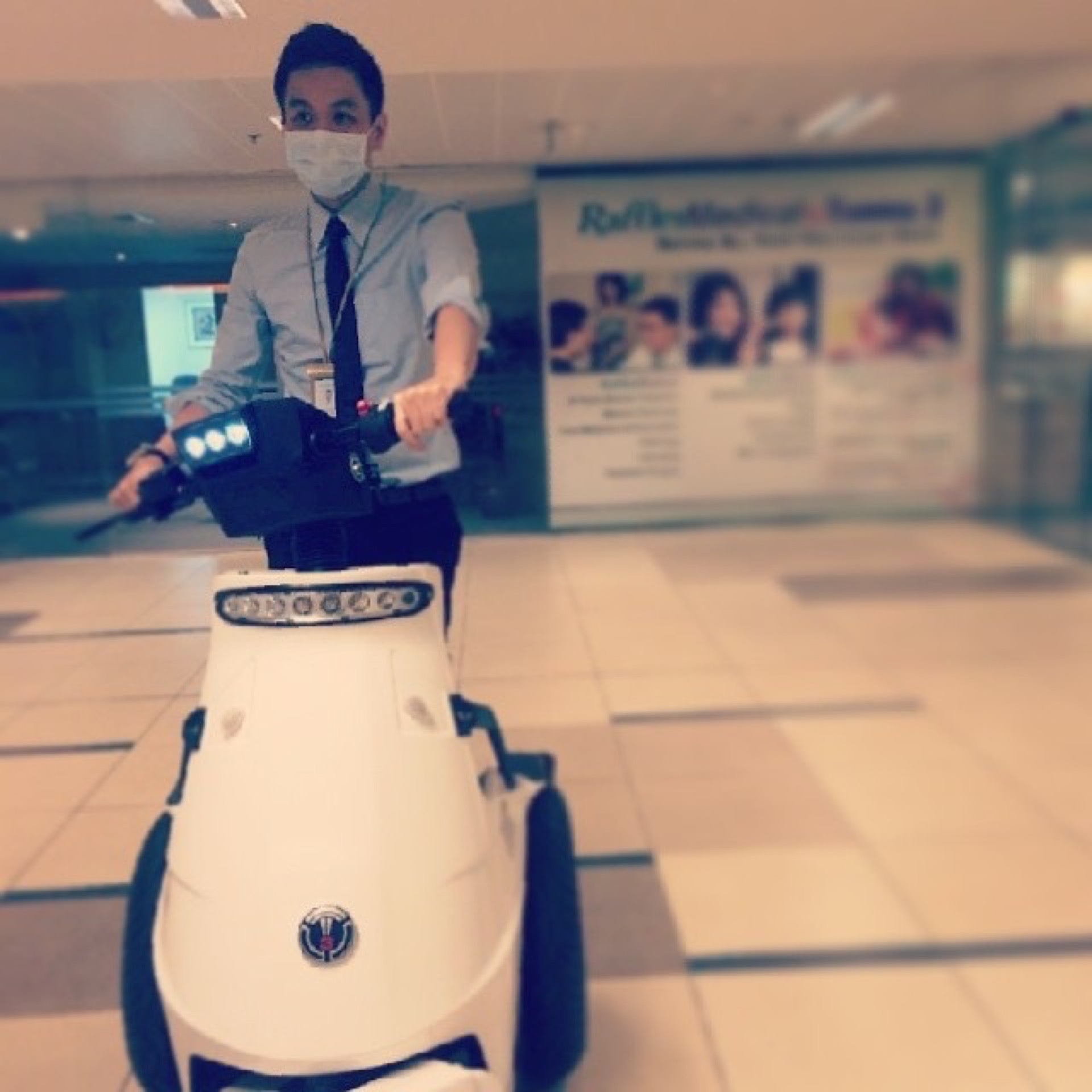 For Dr Choy, seeing a healthier and more vibrant community also inspires him to do more for the community especially the underprivileged ones. However, he believes that his contributions alone are not enough to make a big impact as it needs everyone to play their roles to make this world a better place to live in.
For Dr Choy, seeing a healthier and more vibrant community also inspires him to do more for the community especially the underprivileged ones. However, he believes that his contributions alone are not enough to make a big impact as it needs everyone to play their roles to make this world a better place to live in.  As a doctor, who works at Changi International Airport and has to deal with numerous people of different cultures, it is important for Dr Choy to speak their language as communication is the key. “Always remember that patients come first. What I learned from the 2 universities, where I studied medicine in, is ICE – Ideas, Concerns and Expectations. I was taught to always explore patients’ ideas on certain diseases or conditions, their concerns and also their expectations from the consultation and treatment.” Describing the challenges that he faced at work, Dr Choy said, “One of the most challenging cases that I have handled was performing CPR on an obese patient, who collapsed due to cardiac arrest, on a small aircraft with limited space at the aisle and galley areas, and followed by transferring her to an ambulance using a canvas then onto a stretcher. It was challenging as time was a key factor because every single second counts. The purpose of CPR outside the hospital is to buy time in order to maximise a patient’s survival rate at the hospital.”
As a doctor, who works at Changi International Airport and has to deal with numerous people of different cultures, it is important for Dr Choy to speak their language as communication is the key. “Always remember that patients come first. What I learned from the 2 universities, where I studied medicine in, is ICE – Ideas, Concerns and Expectations. I was taught to always explore patients’ ideas on certain diseases or conditions, their concerns and also their expectations from the consultation and treatment.” Describing the challenges that he faced at work, Dr Choy said, “One of the most challenging cases that I have handled was performing CPR on an obese patient, who collapsed due to cardiac arrest, on a small aircraft with limited space at the aisle and galley areas, and followed by transferring her to an ambulance using a canvas then onto a stretcher. It was challenging as time was a key factor because every single second counts. The purpose of CPR outside the hospital is to buy time in order to maximise a patient’s survival rate at the hospital.” 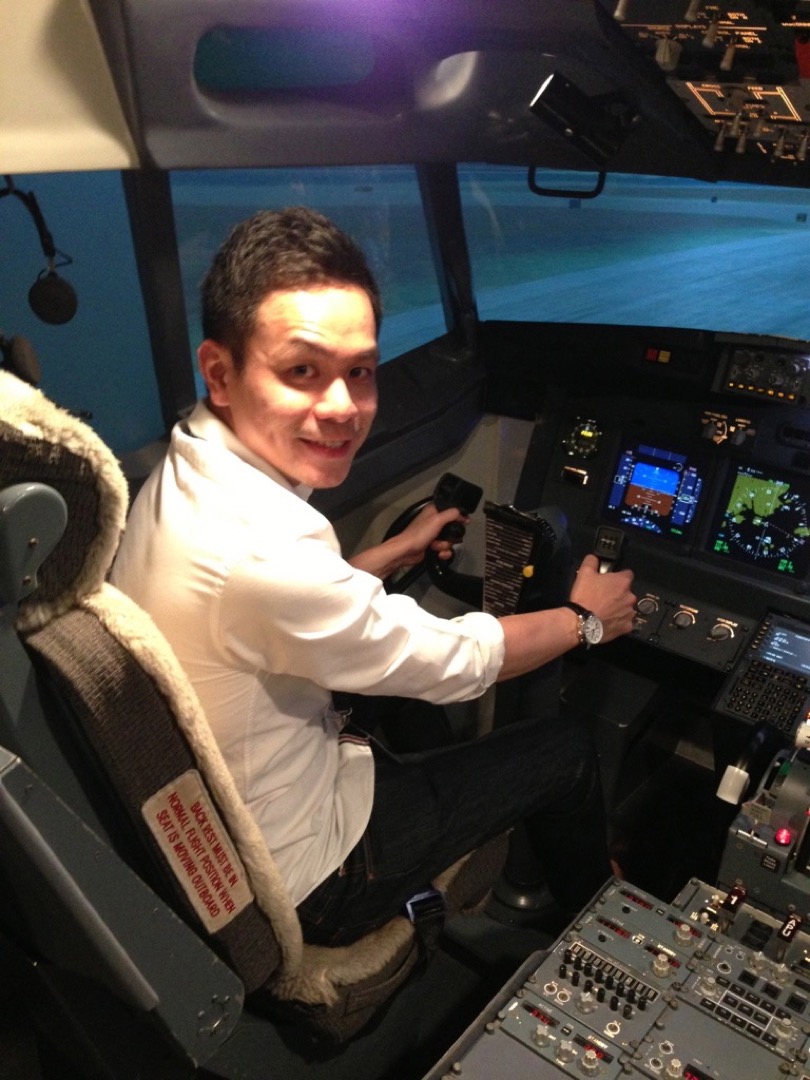 A typical clinical work day for Dr Choy would be going to work early in the morning at 8am and start seeing patients in the 24-hour medical clinic located at the Changi International Airport. “The patients I normally see range from doing check-ups for employment and health screening for insurance purposes; common ailments like cough and cold, chronic illnesses, to industrial injuries like cuts, falls, fractures, bullet shots, thunder strikes, and road traffic accidents. In addition, I also see travellers who feel unwell; require travel advice or a doctor’s certification for fitness to travel, and vaccinations. On busy days, I would have to perform minor surgeries such as incision and drainage, suturing, excision of lumps and bumps.”
A typical clinical work day for Dr Choy would be going to work early in the morning at 8am and start seeing patients in the 24-hour medical clinic located at the Changi International Airport. “The patients I normally see range from doing check-ups for employment and health screening for insurance purposes; common ailments like cough and cold, chronic illnesses, to industrial injuries like cuts, falls, fractures, bullet shots, thunder strikes, and road traffic accidents. In addition, I also see travellers who feel unwell; require travel advice or a doctor’s certification for fitness to travel, and vaccinations. On busy days, I would have to perform minor surgeries such as incision and drainage, suturing, excision of lumps and bumps.” 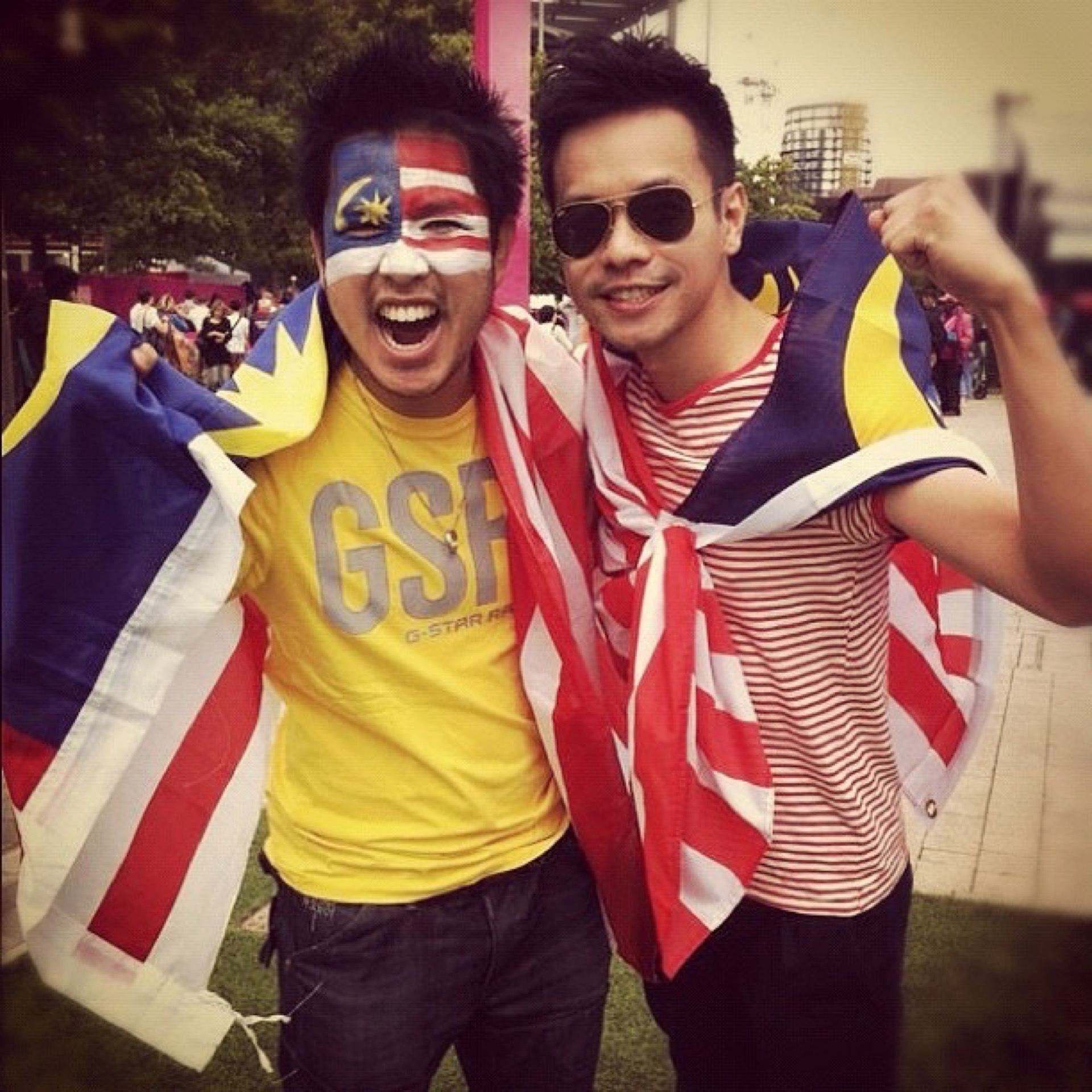 “Being part of the 24-hour medical emergency response team at the airport, we will have to respond to any emergency cases be it on an aircraft or within the airport compound. To name a few, these cases can range from stroke, cardiac arrest, seizures, falls, fractures, road traffic accidents, to attempted suicides. On a busy day I could see about 5 to 8 emergency cases consecutively, where I would be busy running from different terminals of the airport and sending unwell patients to the hospital via our ambulance. The longest number of hours that I have clocked so far was a 30-plus-hour shift and that was pretty exhausting for me.”
“Being part of the 24-hour medical emergency response team at the airport, we will have to respond to any emergency cases be it on an aircraft or within the airport compound. To name a few, these cases can range from stroke, cardiac arrest, seizures, falls, fractures, road traffic accidents, to attempted suicides. On a busy day I could see about 5 to 8 emergency cases consecutively, where I would be busy running from different terminals of the airport and sending unwell patients to the hospital via our ambulance. The longest number of hours that I have clocked so far was a 30-plus-hour shift and that was pretty exhausting for me.” 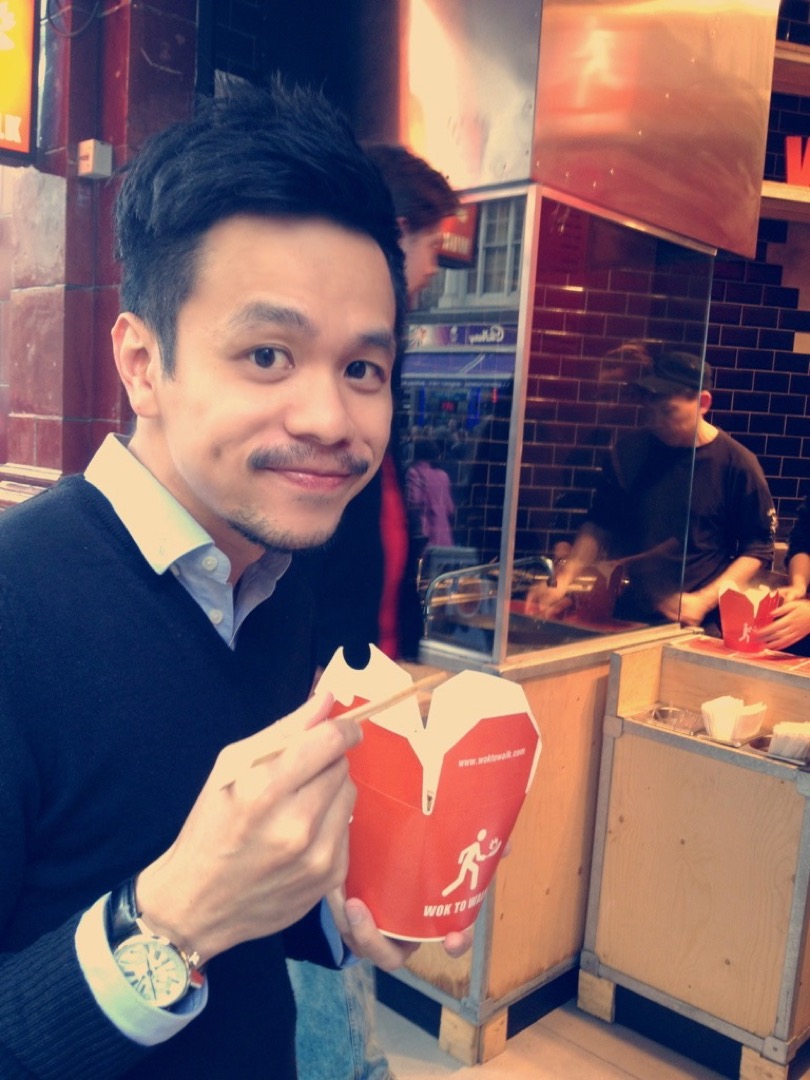 “In addition, it is also a typical routine for me to see pilots for their annual licensing medical examinations during lunch time. Sometimes, I need to attend to death-on-arrival cases which I will have to assess the deceased traveller on board. As a person working in the frontline at the border, I will also have to deal with infectious diseases like Ebola and Mers CoV, to ensure a safe border and prevent such cases from entering Singapore.” “I work in a team with 11 other staffs to support the airport community in a shift system. We rotate among ourselves to take on all sorts of emergency cases.” “Non-clinical duties include meeting with other stakeholders such as the Ministry of Health, airport group and other agencies for policy and protocols implementations, responding to various complaints and managing our doctors’ roster.”
“In addition, it is also a typical routine for me to see pilots for their annual licensing medical examinations during lunch time. Sometimes, I need to attend to death-on-arrival cases which I will have to assess the deceased traveller on board. As a person working in the frontline at the border, I will also have to deal with infectious diseases like Ebola and Mers CoV, to ensure a safe border and prevent such cases from entering Singapore.” “I work in a team with 11 other staffs to support the airport community in a shift system. We rotate among ourselves to take on all sorts of emergency cases.” “Non-clinical duties include meeting with other stakeholders such as the Ministry of Health, airport group and other agencies for policy and protocols implementations, responding to various complaints and managing our doctors’ roster.”
An interesting case that he had encountered was seeing a terminally ill lady on wheelchair, who was diagnosed with end stage pancreatic cancer, requesting to be certified fit to fly back home for treatment in view of financial constraints. Dr Choy managed to link them up with a charity organisation that sponsored the medical escort fee for the patient to fly back to her hometown for further treatment.
| Dr Choy together with a startup entrepreneur, Jack Lee and a reputable app development company, Agmo Studio Sdn Bhd co-founded Doc2Us, a Malaysian-based mobile application which provides access to a doctor at your fingertips. Together, they operate Doc2Us under a joint venture named Heydoc International Sdn Bhd. |
Dr Choy started his foray in the field of medicine at International Medical University (IMU), Malaysia in 2003 and graduated with a medical degree from University of Manchester, United Kingdom (UK). He shared briefly with us his time at the two universities and his future plans.
| What is your most memorable time at IMU? |
| The most memorable time at IMU was playing basketball at an open court next to the campus, which used to be car park cum basketball court, till late night and have supper with my batch mates after the game. Besides, being in the Student Representative Council, I was honoured to be part of the organising committee for the annual IMU Cup which was very well participated by fellow students then. It was a great feeling to see them actively practising and competing in various games as a team. |
| What is your most memorable time at University of Manchester? |
| My most memorable time at University of Manchester was none other than the assistance rendered by my friends who helped me to succeed in my final exams after a few stressful attempts. It was not easy to cope with failing final exams worrying that I might not be able to pursue my dream and vision. Without a doubt, I am truly thankful for this assistance from my friends because it has always been my motivation and dream to become a doctor. I have always envisioned myself helping and improving the health and wellbeing of all mankind through my tiny contribution in the healthcare industry. I must admit that it was not an easy journey. Facing financial difficulties, I had to move out of the rented apartment and stay with different friends every other week. Looking back, I was fortunate enough to have a good bunch of peers (IMU batch mates) who were quite supportive in helping me to pass the exams, not forgetting how they fed me with home-cooked meals and accommodation. They have helped me with my revision and organised mock exams to ensure that I pass my exams in the end. |
| What are the differences studying in the two universities? |
| The transition was rather subtle as I found it pretty easy to adapt to 2 different places. This was especially so as I was surrounded by IMU students who supported each other while studying in University of Manchester. I think the main factors that I had to adapt to were the vast difference in weather, time zone, culture and most obviously the campus environment itself. |
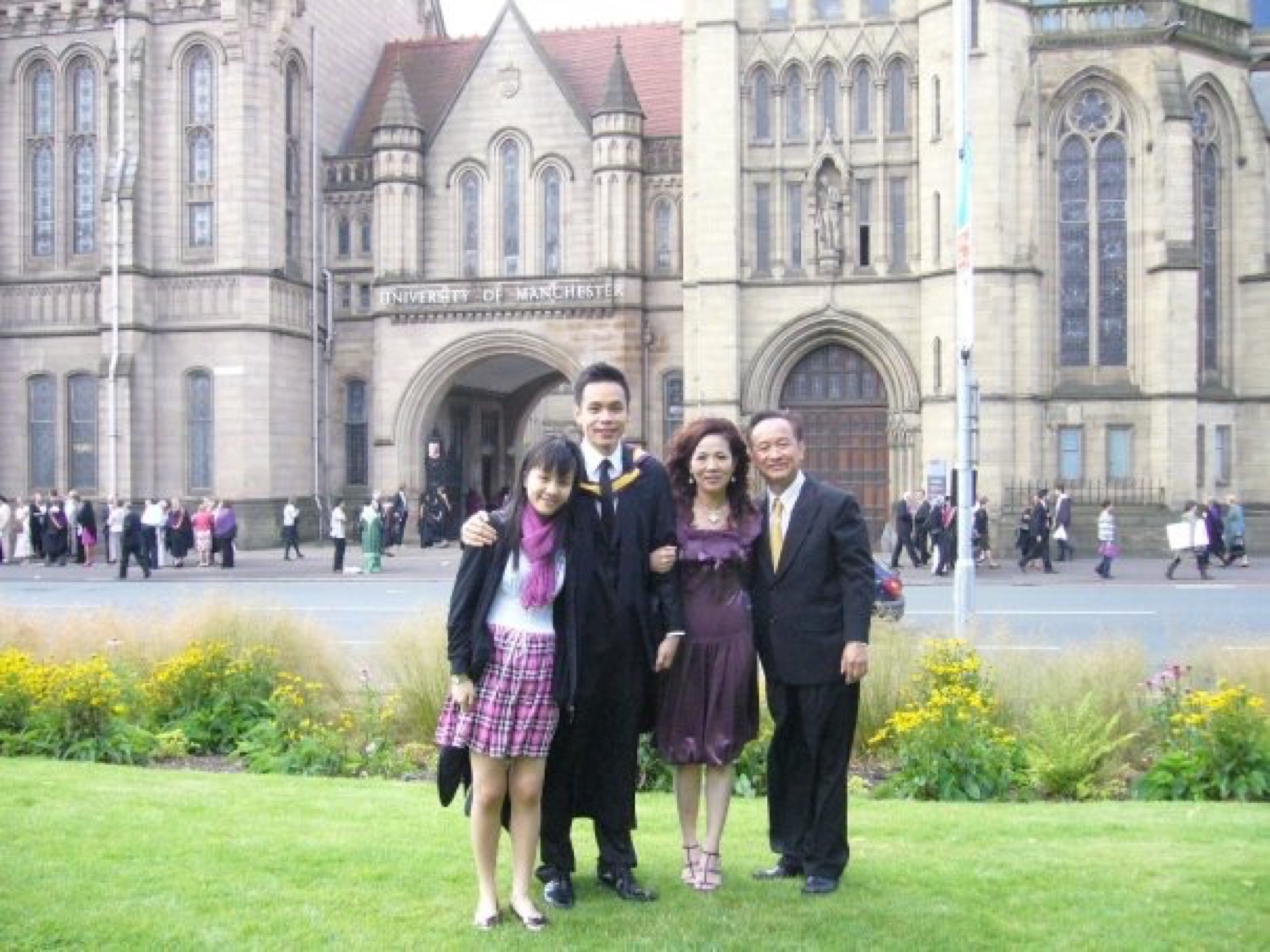
| How well do you think IMU and University of Manchester have prepared you for your current employment? |
| Personally, I think both universities have prepared and shaped me to become a more competent and compassionate person in the area that I am pursuing. It might not be obvious that these 2 institutions have directly led me to my current employment, but I believe that they have moulded me into a better person and more so a team player in the healthcare industry. Nevertheless, they have also opened my mind, making me work towards a better, healthier and more vibrant world. |
| Where did you do your housemanship? |
| I did my housemanship and training at John Radcliffe Hospital, Oxford. |

| Do you feel that having knowledge in different cultures is helpful especially for your current employment? |
| Yes, I do believe in that. It has helped me to understand more about different people’s beliefs, cultures and needs, so that we can tailor a more personalised care for them. |
| What are your future plans? |
| I envision to improve the health and wellbeing of all mankind. This seems like a rather big idea, but I believe that it takes the effort of the whole industry to work cohesively together in order to realise this vision. As such, my future plan lies in taking steps to create an innovative platform so that healthcare providers can reach out to more people. After all, I believe healthcare should be affordable and accessible. |
| What is your advice to inspire future and current doctors? |
Believe in yourself and never underestimate your capabilities of doing great things and making an impact in other peoples’ lives.
Dare to dream and make the effort to pursue your dreams passionately. I always believe in “love what you do, and do what you love”.
|
 For Dr Choy, seeing a healthier and more vibrant community also inspires him to do more for the community especially the underprivileged ones. However, he believes that his contributions alone are not enough to make a big impact as it needs everyone to play their roles to make this world a better place to live in.
For Dr Choy, seeing a healthier and more vibrant community also inspires him to do more for the community especially the underprivileged ones. However, he believes that his contributions alone are not enough to make a big impact as it needs everyone to play their roles to make this world a better place to live in.  As a doctor, who works at Changi International Airport and has to deal with numerous people of different cultures, it is important for Dr Choy to speak their language as communication is the key. “Always remember that patients come first. What I learned from the 2 universities, where I studied medicine in, is ICE – Ideas, Concerns and Expectations. I was taught to always explore patients’ ideas on certain diseases or conditions, their concerns and also their expectations from the consultation and treatment.” Describing the challenges that he faced at work, Dr Choy said, “One of the most challenging cases that I have handled was performing CPR on an obese patient, who collapsed due to cardiac arrest, on a small aircraft with limited space at the aisle and galley areas, and followed by transferring her to an ambulance using a canvas then onto a stretcher. It was challenging as time was a key factor because every single second counts. The purpose of CPR outside the hospital is to buy time in order to maximise a patient’s survival rate at the hospital.”
As a doctor, who works at Changi International Airport and has to deal with numerous people of different cultures, it is important for Dr Choy to speak their language as communication is the key. “Always remember that patients come first. What I learned from the 2 universities, where I studied medicine in, is ICE – Ideas, Concerns and Expectations. I was taught to always explore patients’ ideas on certain diseases or conditions, their concerns and also their expectations from the consultation and treatment.” Describing the challenges that he faced at work, Dr Choy said, “One of the most challenging cases that I have handled was performing CPR on an obese patient, who collapsed due to cardiac arrest, on a small aircraft with limited space at the aisle and galley areas, and followed by transferring her to an ambulance using a canvas then onto a stretcher. It was challenging as time was a key factor because every single second counts. The purpose of CPR outside the hospital is to buy time in order to maximise a patient’s survival rate at the hospital.”  A typical clinical work day for Dr Choy would be going to work early in the morning at 8am and start seeing patients in the 24-hour medical clinic located at the Changi International Airport. “The patients I normally see range from doing check-ups for employment and health screening for insurance purposes; common ailments like cough and cold, chronic illnesses, to industrial injuries like cuts, falls, fractures, bullet shots, thunder strikes, and road traffic accidents. In addition, I also see travellers who feel unwell; require travel advice or a doctor’s certification for fitness to travel, and vaccinations. On busy days, I would have to perform minor surgeries such as incision and drainage, suturing, excision of lumps and bumps.”
A typical clinical work day for Dr Choy would be going to work early in the morning at 8am and start seeing patients in the 24-hour medical clinic located at the Changi International Airport. “The patients I normally see range from doing check-ups for employment and health screening for insurance purposes; common ailments like cough and cold, chronic illnesses, to industrial injuries like cuts, falls, fractures, bullet shots, thunder strikes, and road traffic accidents. In addition, I also see travellers who feel unwell; require travel advice or a doctor’s certification for fitness to travel, and vaccinations. On busy days, I would have to perform minor surgeries such as incision and drainage, suturing, excision of lumps and bumps.”  “Being part of the 24-hour medical emergency response team at the airport, we will have to respond to any emergency cases be it on an aircraft or within the airport compound. To name a few, these cases can range from stroke, cardiac arrest, seizures, falls, fractures, road traffic accidents, to attempted suicides. On a busy day I could see about 5 to 8 emergency cases consecutively, where I would be busy running from different terminals of the airport and sending unwell patients to the hospital via our ambulance. The longest number of hours that I have clocked so far was a 30-plus-hour shift and that was pretty exhausting for me.”
“Being part of the 24-hour medical emergency response team at the airport, we will have to respond to any emergency cases be it on an aircraft or within the airport compound. To name a few, these cases can range from stroke, cardiac arrest, seizures, falls, fractures, road traffic accidents, to attempted suicides. On a busy day I could see about 5 to 8 emergency cases consecutively, where I would be busy running from different terminals of the airport and sending unwell patients to the hospital via our ambulance. The longest number of hours that I have clocked so far was a 30-plus-hour shift and that was pretty exhausting for me.”  “In addition, it is also a typical routine for me to see pilots for their annual licensing medical examinations during lunch time. Sometimes, I need to attend to death-on-arrival cases which I will have to assess the deceased traveller on board. As a person working in the frontline at the border, I will also have to deal with infectious diseases like Ebola and Mers CoV, to ensure a safe border and prevent such cases from entering Singapore.” “I work in a team with 11 other staffs to support the airport community in a shift system. We rotate among ourselves to take on all sorts of emergency cases.” “Non-clinical duties include meeting with other stakeholders such as the Ministry of Health, airport group and other agencies for policy and protocols implementations, responding to various complaints and managing our doctors’ roster.”
“In addition, it is also a typical routine for me to see pilots for their annual licensing medical examinations during lunch time. Sometimes, I need to attend to death-on-arrival cases which I will have to assess the deceased traveller on board. As a person working in the frontline at the border, I will also have to deal with infectious diseases like Ebola and Mers CoV, to ensure a safe border and prevent such cases from entering Singapore.” “I work in a team with 11 other staffs to support the airport community in a shift system. We rotate among ourselves to take on all sorts of emergency cases.” “Non-clinical duties include meeting with other stakeholders such as the Ministry of Health, airport group and other agencies for policy and protocols implementations, responding to various complaints and managing our doctors’ roster.” 



